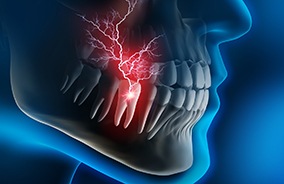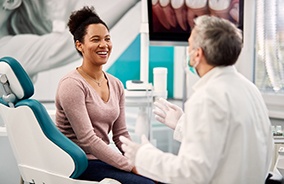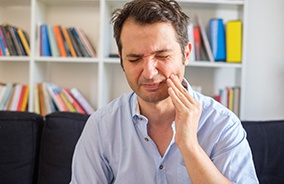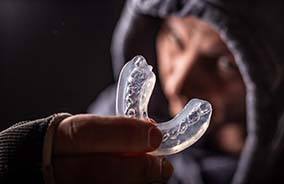

Is a toothache keeping you awake at night? Maybe you fell and broke a tooth? No matter the situation, you need an emergency dentist right away. Dr. David Salibian is here to provide you with the same-day emergency dentistry in Belmont, MA that you need to stop your pain and save your smile. Don’t wait to give us a call; we’ll get you out of discomfort and on the path towards a healthy smile in no time.

Although no one ever expects it to happen to them, dental emergencies are quite common. In fact, research shows one in six Americans experience an oral health emergency every year. If you’re like many people, you might be a bit confused as to what’s classified as a dental emergency. You may not even know what to do if you have one. You’re not alone. To play it safe, give us a call so we can better assess your situation.

Seeking emergency dental care can be stressful enough as it is without having to worry about paying for your treatment. That’s why, at EyeSmile Optometry & Dental Care of Belmont, we offer a variety of financing and payment options so you won’t have to stress about getting the urgent treatment you need. It’s important to also keep in mind that the sooner you schedule an emergency appointment, the higher the chance that we’ll need to use a less invasive treatment to fix the issue. If you need emergency dental care or would like to learn about our financing options, be sure to contact our office today to learn more about the cost of treating dental emergencies in Belmont, MA.

There are several unique factors that go into the emergency dental visit cost. Once our team is able to examine your mouth and assess the severity of your situation, we’ll speak to you about some of these factors:
Our team takes pride in providing honest service, so we will make sure that you’re not left in the dark throughout your visit and will provide you with detailed updates of our findings.

Our team will gladly accept and file most insurance claims on your behalf and keep you updated about the dental emergency cost. We also offer several easy ways to pay and accept cash, check, MasterCard, and Visa, as well as an affordable Wellness Dental Access Plan that provides discounts on all services that we offer. If you have any questions about financing your treatment, you can contact our team or speak with us at your visit!

With dental emergencies, it’s vital to seek out immediate treatment to prevent the problem from getting worse. If you notice any out-of-the-ordinary symptoms or experience dental trauma, don’t hesitate to contact our team of professionals immediately. If you put off being seen, it will likely result in the need for a more invasive, and possibly more costly, treatment down the road as well.

We want to give our patients the power to prevent dental emergencies in Belmont. After all, even with top quality restorative care, it’s always better if you can keep your natural teeth intact for the rest of your life. Some emergencies are unpredictable and can’t really be avoided, but there are plenty of precautions you can take to protect your smile. The following are some basic tips for preventing emergencies. Dr. Salibian can provide you with further suggestions at your next appointment.

Even if you’re doing everything right at home and think that your mouth feels perfectly fine, there could be problems forming in your mouth right now, such as small cavities and early gum disease. Regular six month appointments let us monitor your oral health so that we can intervene while such issues are still small and easy to treat. It’s never a good idea to wait to see the dentist until you think something is wrong; it’s much easier (and less expensive) to stop dental health problems from forming in the first place than to treat an emergency.

Cavities and gum disease occur when bacteria and plaque are allowed to stay on your teeth for too long. Bacteria can eventually produce acids that eat through your enamel, damaging the dental structure and eventually exposing the insides of the tooth to infection. Brushing and flossing help remove bacteria before they have a chance to inflict serious damage to your smile. You should brush at least two times every day for two minutes at a time; make sure that you’re flossing on a daily basis as well.

Are you eating foods that are good for your teeth and gums? Good examples include fresh fruits, vegetables, dairy products, and whole grains. The nutrients they contain contribute to a healthier mouth that’s more resistant to decay and disease. Crunchy fruits and vegetables are particularly beneficial since they can remove bacteria from the surfaces of your mouth while you eat them. Make sure that you’re not eating too much sugar, though, as it can accelerate the rate of tooth decay if it’s present in your mouth for long periods of time.

Teeth can easily get broken or knocked out when play sports, but you can protect them with a customized mouthguard. The appliance will absorb and redistribute some of the force when you get hit in the face or mouth, keeping your teeth safe from the worst of it. Mouthguards are also recommended if you grind your teeth in your sleep. Keeping the teeth separated will help stop them from becoming worn down or cracked over time.

Remember that teeth are not tools. They are made to chew food and help you speak; they are not designed to tear or break open inedible objects. So if you use them to tear open packages, you might end up damaging them in the long term. Get some scissors or another tool to help you open the package instead.

It’s always better to be prepared, even if it’s for events like dental emergencies that you hope never occur in the first place. However, when you are dealing with a dental emergency, knowing what to do next can make the difference between saving a tooth and needing it extracted. That’s why we’ve included a series of the most common questions we receive here at EyeSmile Optometry & Dental Care of Belmont! If you have any additional questions that weren’t listed, please don’t hesitate to give our office a call directly. We look forward to helping you out in any way that we can!
We do not recommend going to an emergency room for a few different reasons. For one, most ERs are not equipped to treat your dental emergency. Furthermore, they often don’t have the training or even the permission to perform treatments that you might find in a dental office. Instead, they are more likely to give you painkillers and tell you there’s nothing they can do. The only time you should visit an emergency room for care over the dentist is if you have a broken jaw or excessive oral bleeding.
Dental pain is best aided by anti-inflammatory medications, which include ibuprofen or acetaminophen. However, it can also help to create a saltwater mixture and rinse it around your mouth for 30 seconds to a minute. To create this mixture, simply combine ½ teaspoon of salt and 8 ounces of warm water. If you’d like a more natural approach to pain relief, apply clove oil to the tooth using a cotton ball.
In the overwhelming majority of dental emergencies, teeth do not get better on their own. Damaged or aching teeth are not like a cold or a small cut on your arm, both of which either go away or heal on their own after enough time. When tooth enamel is broken, it stays that way until it’s restored with a crown or filling. Toothaches don’t go away; in fact, they often get worse the longer you go without treatment. This is why we always recommend patients to call us in the event they feel something is wrong.
Do your best to find the tooth as soon as possible. Make sure to keep it moist by keeping it contained in milk or saline solution. Keep in mind that just because it’s a baby tooth does not mean you should assume that it’s normal for it to come out. Instead, you should treat it like an adult tooth that was knocked out and get to our office as soon as possible.
It’s a common misconception that pain is the only symptom that requires emergency dental care. However, it’s important to remember that dental damage of any kind necessitates an appointment (although it doesn’t always have to be the very same day). For chipped teeth specifically, there’s a chance that your surrounding teeth were damaged in the process and that the tooth is vulnerable to splitting further. That’s why we recommend giving us a call, even if your chipped tooth isn’t causing any pain.
Not from home! Although many patients think that superglue or a denture repair kit are suitable alternatives, these measures can end up damaging your restoration even more. That’s why we encourage patients to get in touch with the dentist who made their denture instead. This will ensure that they can repair or replace it ASAP.
In short, the answer is “no.” Instead, we recommend placing a knocked-out tooth in a container of milk or saliva since these can help preserve the root. If neither is available, then you do have another option: placing the tooth back in its socket. It’s important to note, however, that you should only do so if you don’t have to apply excess force to put it back in position.
There are several reasons your jaw may be hurting, from an impacted wisdom tooth to untreated TMJ disorder. For this reason, we will start your emergency exam with X-rays and a visual inspection. After checking your bite, learning more about your symptoms, and looking at your teeth and gums, we will be able to determine what’s causing your jaw pain and, perhaps more importantly, how you can fix it.
No, toothpicks are not safe to use. While the sharp edge may seem convenient when there is something stuck between your teeth, they can actually push the debris further into the crevice or underneath your gumline. Furthermore, a piece of the wood can easily splint off, resulting in a soft tissue injury in the process. Last, but most certainly not least, a toothpick can be deadly if you accidentally swallow it. For all of these reasons, we don’t recommend using a toothpick.
Chronic bad breath can make you feel incredibly self-conscious; however, it’s not always the result of an untreated oral health concern. For example, it could be due to your diet, particularly if it’s high in garlic, onions, and other pungent foods. With that said, if the odor on your breath persists even after chewing on gum or completing your oral hygiene regimen, then we do recommend scheduling an appointment. From there, we can determine if gum disease, tooth decay, or something similar is the source.
I am Looking for Eyeglasses or Frames I am Interested in Designer Frames I am Interested in Contact Lenses I Need Therapeutic Contact Lenses I Have an Eye Emergency I Need Myopia Treatment I Need Help with Dry Eye Management I Need Help with Eye Disease Management View Our Optometry Services View Our Dental Services